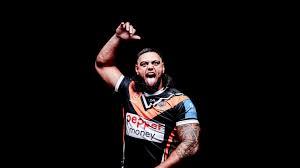The rise of modern NRL leaders

The National Rugby League (NRL) has always been about leadership. Raw talent can win games, but it's leadership that builds a culture, inspires teammates, and develops champions. There have been new leaders in the NRL during the past ten years. A new group of captains and role models has stepped up to help their teams deal with intense competition and public criticism.
These new leaders bring new energy, professionalism, and emotional intelligence to the sport. These are attributes that are altering what it means to be a captain in modern rugby league.
An overview of the evolution of leadership in the NRL
In the past, NRL captains were usually picked because they were older or stronger. They were intended to set an example on the field and get their teammates to work hard. Being tough is still vital, but today's NRL leaders need more than that.
-
Today, captains have to deal with a lot of media attention.
-
Help players stay mentally and physically healthy.
-
Make your team cultures open and helpful.
-
Learn both the physical and strategic sides of the game.
Clubs now want their leaders to be well-rounded individuals who can inspire their teammates both on and off the field. Younger captains who excel in their skills and possess emotional intelligence can now lead.
The emergence of younger captains
In the past, captains were usually older veterans who were about to retire. More and more, companies are hiring younger people who act older than they are. This strategy keeps the leaders of teams in place for a long time and helps newer teams at the same time.
-
These new leaders are frequently known for being consistent and having a strong work ethic.
-
Talk to your teammates and coaches in a clear way.
-
They demonstrate a willingness to assume responsibility and accountability.
-
Instead of wanting to be the best, think about the team.
This new generation shows a more well-rounded way of leading, one that values both character and numbers.
The example of Tino Fa’asuamaleaui
Tino Fa'asuamaleaui, captain of the Gold Coast Titans, is one of the best examples of this new way of leading. He was only 22 years old when he was given the job, and he soon showed that leadership is more about mindset than age. Tino is well-respected in the league for his tireless effort, calm demeanor, and strong competition.
He combines old-school toughness with new-school emotional intelligence by lifting his teammates up when things go rough, setting high standards, and creating strong cultural ties among his team. His leadership shows that younger players can do well when they are given responsibility.
Fans may discover more about Tino Fa'asuamaleaui and how quickly he rose to fame. This shows how attitudes towards leadership are changing in the NRL.
Building a positive team culture
Today's NRL captains know that winning games is just as important as developing a culture. The internal climate of a team often decides how well it will do in the long run.
Captains now work closely with coaches and welfare staff to make sure that changing rooms are respectful.
-
Take care of mental health and well-being issues as soon as possible.
-
Encourage players to talk to each other.
-
Help younger players move up to first grade.
-
Support younger players transitioning into first grade.
By focusing on culture, leaders make places where players feel respected and driven, which leads to continuous success.
Balancing performance and leadership
One of the hardest things for leaders today is to achieve a balance between their own work and their duties as a leader. It takes strength and discipline for captains to keep their high standards while leading others.
This balance is possible, as players like Tino Fa'asuamaleaui illustrate. Even with the extra stress of being a leader, he still plays at an exceptional level, showing that effective leaders can help both themselves and their teams. His tale, which can be seen on sites like Tino Fa'asuamaleaui's career page, shows what it's like to be a modern captain, both the good and the bad.
Role models beyond the field
People that lead the NRL today should also be good role models off the field. They typically go to community activities, media appearances, and charitable programs on behalf of their clubs. Fans, especially young ones, interpret the sport differently based on how they act.
Because they are in the public eye, captains must show honesty, discipline, and humility. The media closely monitors athletes, and their actions have the potential to positively or negatively impact their club's reputation.
Inspiring the next generation
These new leaders have an effect on more than just their own teams. They inspire the next generation of players by showing that being a leader is about more than just winning. Young athletes learn that respect, hard work, and empathy can be just as strong as physical strength.
As grassroots rugby league programs grow in Australia, many young players look up to captains like Tino and try to be like them in more than just how they play on the field.
Conclusion
The NRL's new leaders are changing what it means to be a captain. Clubs no longer just want leaders who are tough or have been around for a long time. They want leaders who are emotionally intelligent, culturally sensitive, and responsible in public.
Tino Fa'asuamaleaui and other players have shown that age doesn't stop someone from becoming a successful leader. This change is beneficial for the game because it means that the future of rugby league leadership in Australia will be based on character, empathy, and lasting effect.
For More Information visit: theaustralianpost & dailytrends






